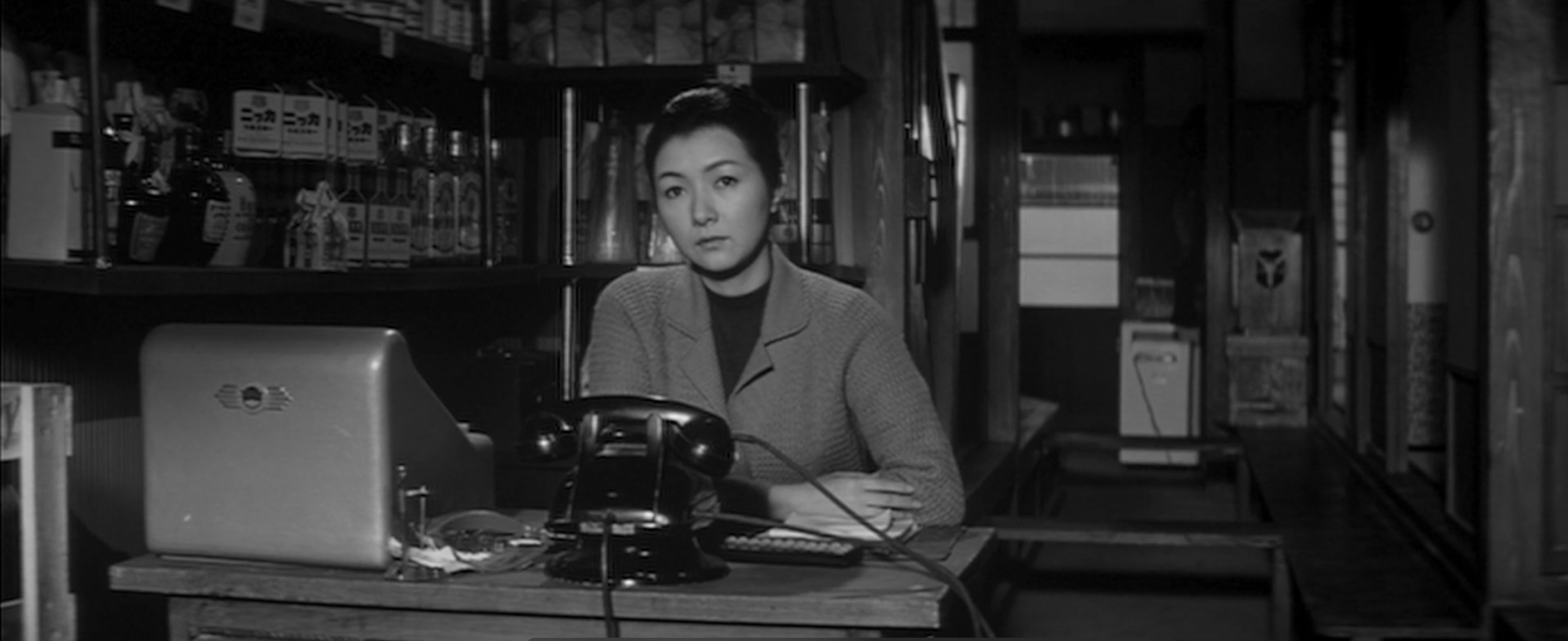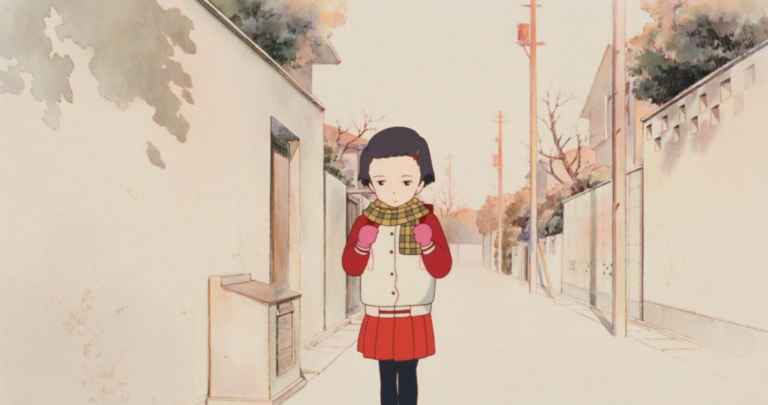“Koji-San—” she utters, frosted by the bite of air in an unplanned destination. “I’m a woman,” she expiates softly. “When you said you love me, I felt very glad.” Oddly, what must seem tantamount to a confession from Reiko is said with such resignation. The prickly silence that stalled this utterance rendered the viewer a palpable tension. Yet now, in a few simple words, it has been sliced through. Repressed love, for much of cinema’s history and even in the history of novels, has found encouraging solace to do away with the weight of its yoke. One of Mikio Naruse’s finest hours, Yearning sees a dimension in it that wins far more often in reality. The want, a pulsating want, to continue one’s love for the act of repressing itself.
What cannons Yearning into one of my favorite pieces on this subject is the platform that it stands on — post-war amnesia. When a populace comes out of crippling duress, there is much to observe in how they reinvigorate even the most seemingly innocuous practices of the years that preceded the interregnum. Many have taken up this platform, especially in the Axis nations. Rainer Werner Fassbinder deals extensively with the degradation of German society and its obsession with pleasure-seeking to the hilt. In Japan, Naruse’s contemporary Yasujiro Ozu deals with the breakdown of the family as Japan’s fundamental building block. However, Naruse’s path runs counter. The oeuvre of one of the lesser-known masters of this post-war era is focused much more heavily on the individual’s contortions within the disintegrating strength of Japanese families.
Nonetheless, great platforms have sparsely translated into great films. That translation requires a great perspicacity to read between the lines, and Naruse is deft in realizing the main undercurrent that is upheaving Japan. A country, largely isolated for centuries, very much driven by the exertions of the animate, the alive. The rush of America’s cultural installments rapidly unsettles a population that has only just rediscovered the quaintness of peacetime routines. The very first scene in the film is a supermarket roadshow advertisement; the air is stifled by claustrophobic and jarring notes heralding its arrival. Its imposition on the landscape is carefully made to be felt. “That market killed him,” exclaims a victim’s wife. Indeed, modernity did ruffle all societies, but somehow Japan’s penchant for order makes it such a unique case to observe. All the cavities of power were rapidly being filled by inanimate entities and those crowded out had to survive within or beneath them.
On such a platform, where old ways are rapidly being discarded, culture is being morphed like clay, and a strong atavism for holding together the past is where Naruse unfolds a question of love and its loyalties. But directors of a realist brand of cinema seldom choose circumstances, more often the reverse transpires. Perspicacity has given a great platform and a clear path to a great film. How Naruse translates it — in the little filaments, the long and short pauses — is what makes Yearning move beyond staple praise. When I first watched the film and chose to watch it again for the second time in just under a year, there was a very eerie quality to it that kept calling me back. Now as I sit down to enumerate them, I cannot help but commence with Hideko Takamine’s Reiko.
Playing a widow is often likened to someone who ghosts the hallways, made half-dead by volition and half-alive by necessity. However, in both Ozu’s Tokyo Story and Naruse’s Yearning, they focus on zealous women who feel duty-bound to live on as their partner’s replacements within their adopted families. Reiko, having spent 18 years after her husband’s death running the family shop, is selflessly devoted to their wellbeing. She exerts the most, worries the most, and above all, grudges the least. Here is a woman who has lived with all her might and will, yet in perfunctory satisfaction not for herself. “Koji-San! Be serious once and for all,” she berates her brother-in-law for skirting around her questions. She is fragile, but in actively trying to not be so, she often forgets how that condition feels. But beyond this feigned firmness, Takamine consistently brings out with micro-expressions, pauses, and uncomfortable smirks a younger woman who hides behind her resolve. In some ways, the unsure footing is also a feature of the director himself. In their many collaborations, Takamine recollected that Naruse was very unresponsive regardless of what was offered in the way of performance and never set out to offer acting requirements. All actors were left to, without surety, conjure what they felt best with a seemingly required hesitancy.
This seeming hesitancy extends to even other components of the film. Ichirō Saitō’s score is amongst the best I’ve heard for its period. The long, drawn-out notes in the titular theme are each pressed together like the steps of a debutante in her first ball. The pace is unsure, the crescendos unsure whether to continue or to dip, and above all, a small flutter that is steady in echoing the murmurs of a heart ill at ease. In Naruse’s hands, it becomes a careful insertion that shows — at important junctures — Reiko reckoning with the reality that she chose instinctively, which is conscientiously comfortable, and a reality that she may have to choose deliberately, which displaces that comfort. Yuzo Kayama’s Koji, though playing with much lesser layers than Takamine’s, displays an intransigence for personal happiness that beards her want for moral familiarity.
As it should for great films, these elements are tied in together expertly. Yet, in my first viewing, it overwhelmed me to the point where I refrained from writing about it because I felt I wouldn’t be able to bring to words something so central to the viewing experience. Now, a year later, I’m able to precise Naruse’s masterly touch to the spectral, protracted passage in the pre-climax. Until that moment, the dynamic between Reiko and Koji seemed mutually solicitous — hers a sisterly devotion, his a brash gratitude — but, in truth, the layer beneath was two people negotiating with each other while standing on different platforms. Reiko, a relic of the war and a desire for the world that preceded it; Koji, a drifter who wishes to sail forward but not without an anchor to the past. Both offer each other their companionship knowing well what the other desires, existing in a society that is forced to re-evaluate proper and improper.
One has to snap under its pressure. Koji does, and it sets their platforms further apart. As she boards her train, content that her lackadaisical warmth for the past can keep her afloat, he cannot resist and boards her train. She spots him entering the carriage. There’s a great fear that Takamine’s face swallows with as little resistance as possible. As Naruse cuts back and forth, fear is beaten down by doubt, and doubt by hope, with only the shuffling of the wheels over tracks knocking on still air. She smirks, which is returned with a wide grin. As they take away to a place far away, everything else suspended while in motion, they finally settle to speak with each other on the same platform.
As dawn breaks and the cool morning sun stripes across his face, they have already drifted apart. As many have, she too realizes that she cannot love him for it would make life itself too unfamiliar for her. It all seems too much to answer, but as they disembark hastily at her request, she realizes that she must disengage yet slowly. What follows is then confession, resignation, and exile. She cannot abandon her moral standing nor her conjugal piety, and he cannot escape the weight of dead hope. Clouded over by war’s long-armed amnesia, one is led on too much by possibilities of the future and the other is sprung firmly back to the past. Flooded by morning light, she watches a man crushed by promise being taken away, proclaimed dead. Her face convulses with shock, but soon it settles, almost as if she reconciles within that her propriety would never have allowed a relationship that takes away the simpler comfort endowed to all survivors of war — to yearn and to do so endlessly, to live and re-live moments selectively, to pause only on what is pleasant. Strung together like a tapestry and acted intentionally to belie, Naruse and Takamine spin together one of the finest cinematic displays of spurned love, resembling a crown jewel for anyone who looks at their shared career.
Nonetheless, war has left many defeated civilizations. As Japan’s society is put through ordeals of the vanquished, so is Germany. Cultural undercurrents leading up to the war are the ones that often loom large over practices in the world after. With a host of filmmakers documenting a new rise for their respective nations, there is a great deal to be explored in the period immediately after the war for the two nations that were the most authoritarian. Taking this as a starting point, I plan to write more along this line of exploration, visiting and sometimes re-visiting the great pieces of post-war cinema from the eyes of the downfallen.





